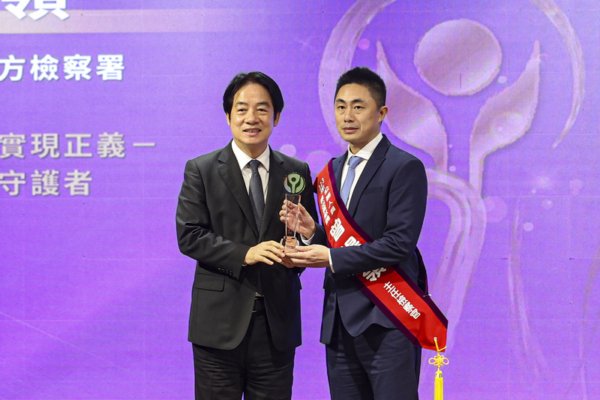On December 18, 2024, President of the Republic of China (Taiwan), Lai Ching-te, personally presented the Outstanding Contribution Award to public servants, including Chief Prosecutor Zeng Yang-ling of the Taipei District Prosecutor’s Office who cracked the fraud group torture case. Reflecting on the investigation process, Zeng recalled the unforgettable scene of victims being tortured and imprisoned for several days, covered in injuries with fearful eyes. He described rescuing the victims as the most meaningful moment in his career as a prosecutor.
President Lai Ching-te attended the “113th (2024) Outstanding Contribution Award Ceremony for Public Servants” on the afternoon of the 17th, commending all the awardees for setting exemplary standards and making outstanding contributions to building a better Taiwan. He emphasized the importance of enhancing digital literacy among public servants and implementing the concept of smart governance in various government projects to make the people happier, the country stronger, and to have the world embrace Taiwan.
President Lai expressed in his speech that the “Outstanding Contribution Award for Public Servants” is considered the “Oscar Award of the public service sector,” representing the highest honor in the field. He congratulated all the awardees and thanked them for setting examples for their colleagues and for their exceptional contributions to Taiwan. He especially highlighted how each awardee had shown professionalism, innovation, and significant achievements.
Continuing, President Lai introduced each awardee individually, including Chief Prosecutor Zeng Yang-ling from the Taipei District Prosecutor’s Office, recognized for handling numerous major fraud cases. He stressed that the public expects the government to strengthen anti-fraud efforts and hoped that the award ceremony would inspire related entities to play a more substantial role. He emphasized that public servants are essential pillars of the country’s operations, safeguarders of democratic values, and important frontline troops for enhancing the well-being of the people, stating that it is the dedication and unwavering commitment of public servants that propel the nation forward steadily.
President Lai congratulated all the awardees once again, urging everyone to continue working together to promote the progress and development of the country. He then personally presented the “Outstanding Contribution Award for Public Servants” to the awardees and representatives of their respective groups, acknowledging their exceptional contributions.
According to reports from the Central News Agency, in 2022, there was a case in New Taipei City where job seekers were held captive by a fraud group. After multiple police operations, 58 victims were rescued from captivity, while sadly, three victims were found dead and abandoned, reminiscent of the “Taiwanese version of the Cambodian case.” After receiving the award, Chief Prosecutor Zeng Yang-ling told reporters that he was inspired by the Japanese drama “HERO,” which narrated stories of prosecutors, during his academic years. This inspiration led him to pursue a career as a prosecutor with a strong commitment to achieving fairness and justice.
Zeng expressed his belief that justice should not only be realized but should also be achieved in a way visible to the people. He emphasized the importance of making the justice system transparent and trustworthy for the public, stating that it is the duty of all law enforcement personnel.
Recalling the investigation of the fraud and torture case involving the syndicate, Zeng revealed the daunting challenges faced during the investigation. He recounted the shock of discovering such incidents in Taiwan and the poignant moment when victims, covered in wounds, expressed gratitude upon being rescued, highlighting it as one of the most meaningful moments in his career as a prosecutor.
Zeng remembered the initial discovery of the fraud group holding 26 victims captive in Tamsui, and after examining the suspects’ phones, they found 35 more victims imprisoned in Taoyuan. The dedicated task force then regrouped and rushed to Taoyuan, only to find 32 individuals there, leading to the discovery that three victims were already deceased. These victims had been professionally disposed of by a “body disposal team” into the mountains of Taoyuan and Nantou by the fraud group.
He revealed that the fraud group had held the victims captive for 40 days, amassing fraudulent funds exceeding NT$460 million, with over 360 victims deceived. The investigative team analyzed the flow of funds and discovered a sophisticated laundering process involving at least seven layers of accounts before reaching the leader “Blue Way” Du Cheng-zhe’s encrypted cryptocurrency cold wallet, which took only 12 minutes entirely. Unraveling this intricate detail consumed over five months of diligent work by the investigative team.
Zeng explained that tracking cryptocurrency flows presented significant challenges, but through extensive analysis of coin flow data by the prosecution’s coin flow analysis team and the New Taipei City Political Crime Investigation Team, they identified the key figure, “Blue Way” Du Cheng-zhe, and his cold wallet. Subsequently, they uncovered another case involving a Taipei City Ninxia Road Police Station chief implicated in collaboration with the fraud group for receiving bribes in virtual currency, marking the first virtual currency bribery case in the country. Through collaborative efforts, the entire criminal syndicate was successfully dismantled.
Facing the prevailing wave of fraud and public discontent, Zeng shared his views on the government’s dedicated efforts in combating scams. As the new Anti-Fraud Act came into effect, strict regulations were implemented for advertisers, financial institutions, and virtual currencies, while technological investigation methods were institutionalized, providing significant assistance to law enforcement agencies in combating fraud.
Observing the changing patterns of fraud groups in the past two years, Zeng noted that schemes like the Taiwan-version of the Cambodian case involved laundering funds through dummy accounts into virtual currencies, but with increased regulations on these accounts, the fraud groups shifted to using couriers for cash transactions to circumvent the restrictions. While current anti-fraud measures remain effective in frontline operations, the impact of the new Anti-Fraud Act may take time to reflect in data, underscoring the need for continuous efforts and vigilance.

